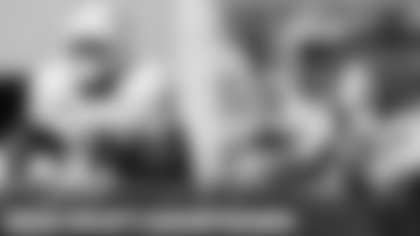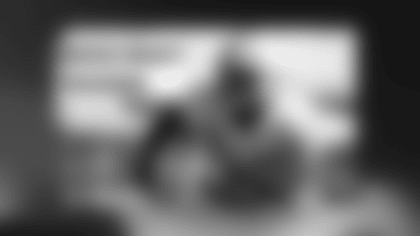[wysifield-embeddedaudio|eid="361961"|type="embeddedaudio"|view_mode="full"]
PATRIOTS HEAD COACH BILL BELICHICK
Q: What are the similarities and differences between Blake Bortles and Ben Roethlisberger?
BB:I think Bortles looks pretty fast, kind of like [Tyrod] Taylor. He's got a couple 30-yard gains and that kind of thing. He's pretty dangerous to just take off and run and can get a lot of yardage. His athleticism can buy time in the pocket. He's a good passer. But I'd say he's probably a little bit more of a threat to run with the ball than Roethlisberger. Roethlisberger is probably more apt to buy extra time to watch the play extend and then hit somebody down the field, that type of thing.
Q: Is it just as hard to bring down Bortles as Roethlisberger?
BB:I don't know if anybody is as hard to bring down as Roethlisberger. He's pretty hard. I mean, not to take anything away from anybody else, but Roethlisberger, he's a big guy.
Q: Has the two-point conversion turned from a novelty play to a more mainstream, and do you practice more to stop it?
BB:We prepare for them every week so there is not a week that goes by that we don't look at that, but in the end, it's like a lot of situations we prepare for – some and some come up and some don't. I thought that our game with Buffalo and the missed extra point, that led to some point differentials that are not as common and then that probably prompted those tries for Buffalo, and the score kind of got out of sync a little bit there. I don't think that's a bad thing for the game. Just like I said before, I think it just makes the play a little more competitive. It's still a very high percentage play, but it's just not the very, very close to 100 percent that it was. So, I personally think that is good, that's why we supported it.
Q: Do you like seeing more teams go for two?
BB:Yeah, whatever they decide to do, they decide to do. We don't have any control over that. If it comes up, then we have to stop it, just like we always have.
Q: What do you think of the Jaguars defensive line?
BB:It's a really good group. I know [Sen'Derrick] Marks and [Andre] Branch are hurt, but they still are very disruptive up there. [Roy] Miller [III] plays really hard, he's a tough guy and he's active in there. [Tyson] Alualu is another big, strong physical guy who's played outside and now the three-technique. [Michael] Bennett is an active guy in there, too. [Jared] Odrick is definitely a problem. [Chris] Clemons, I know he is an older player, but he is very disruptive, still has a good array of moves. He is a very experienced and good technique rusher. They have a lot of guys that can give you a lot of problems up there. They are really good. [Dan] Skuta has been a problem, too. He's part of that whole pass-rush problem where they bring five out of their regular defense or use him some in some nickel situations. He had a couple plays in the Carolina game where he hit the quarterback. They are all a part of it. The volume of guys, and the number of good players they have up front to rush the passer and their versatility in terms of running games and various stunts and so forth, they create a lot of problems, they do a good job, and they have a real good group, a talented group.
Q: Is it a coaching challenge to sometime find opportunities to get guys involved?
BB:Yeah, it really is. That's a great point that you brought up there and it's one that we constantly talk about and try to maximize and it's not easy. For me, it went back to kind of my days as the defensive coordinator for the New York Giants. We had a lot of depth at linebacker. Honestly, there were times when we could have played six linebackers, and there were even some passing situations where we did, where we took the defensive line out of the game and put all of the linebackers on the field. But it's hard to do things like that over an extended period of time. Say you have a scheme, and you've worked on that scheme all week, all year, and then to do something that is pretty far off of that, it's okay as a changeup I guess, but then it takes away what you've been working on and what you've been trying to construct. It's hard to feature that. I know I give you guys a hard time every week. You look at the production sheet, carries, receptions, targets, whatever, and there are going to be guys on the top of that and there are going to be guys that have fewer and you always ask what happens to them, what happened to them in this game. Sometimes that is a function of the game, the game plan, or just the way the game played out. But if they're on our team and we put them out on the field, it's because we want them out there, we think they can be productive, they've earned that opportunity, and sometimes they got more opportunities than others and sometimes after a period maybe of lesser activity or fewer opportunities, then those opportunities come and they do well with them, and then it looks different than what it really is, like all of sudden there was some really big improvement and it really is just a question of opportunity. Some of those opportunities you can control as a coach, but a lot of them you can't. When the ball snaps, we don't know what's going to happen, especially on defensive side of the ball. We don't know where it's going to go or what they are going to do, we just have to react to it. It definitely is a challenge. You want to have guys involved and you want to have them have roles, but each game sometimes the scheme overrides an individual player and you have to be in a particular scheme for a percentage of the time that takes certain players out of play, but you feel like that's what you need to do to be competitive. So, it's definitely a challenge. It's a good problem to have. You're certainly better off having more players, where it's hard to utilize all of them rather than having a few players and it all falls on one guy's shoulders, kind of like when I got here with Troy Brown and 15 passes a game were going to him. I mean, he's a good player, but in part because there weren't a lot of other options. It's better to be in the other position where you have more options and you use the ones that you feel are best for your team, and that's probably something that's helped our team though the years win games is the depth that we've had at positions and how many different players we've had come through in one way or another, whether it be the skill positions or not at the skill positions to help the team win when they were called on. That's part of having a good team. It is definitely a challenge, but you have to, particularly on the defensive side of the ball, you have to stop what they do, and some players on your roster may be better suited to stop certain things than others, as opposed to having the same guys out there for every single play. People my age, your age, that's kind of the way we grew up watching the game. I know when I watched pro football and when I first came into the league, it was basically the same 11 guys out there. It didn't matter if you had the ball on their one-yard line or if you had the ball with five seconds to go in the game, there were two receivers, two backs and a tight end, and the defense was in 4-3. And then it was such a revolutionary step to add a third receiver or put in a nickel back, even though the nickel back really wasn't a nickel back – all he was was a linebacker that was a smaller or more athletic guy. So, you're used to seeing the same people out there. So, that production is more consistent and comparable than what we have now where, so frequently in the league, us and everybody else, at the end of the play, two or three guys run onto the field, and two or three guys run off the field. It's just a different way of getting used to that. I'm not saying it's a bad thing or a good thing, it's just different.
Q: How does it complicate matters when preparing for a team like Jacksonville that you don't play as often? Do you take a sneak peek in the offseason to get a better look at their personnel?
BB:Yeah absolutely. We spent, even before the draft, but particularly after the draft, in that period from April till mid-June, one of the things that we do as a staff is we look very hard at our new opponents and also our early-season opponents just to make sure that we see what's relevant from last year and then when we see this year's film, is it the same, is it different. Maybe some things are the same, but they're using players differently or they've added a different component to their scheme somehow, that type of thing. Yeah, absolutely, we spent a lot of time on Jacksonville. I've seen probably well over half their season from last year, from 2014. Now they're changing offensive coordinators, so that's obviously effected it some, but we've put a lot of time in trying get to know the players on the team from last year, what changes they've made this year, how they're using those players the same or differently. Obviously if it's the same, then that's a pretty good indication that you know what is and this is what it's going to be. There is definitely a big component in that, making sure that we are fully prepared for what our opponents have done and what they are capable of doing and if they are trending one way or another, that we are trying to keep up with that trend and not react to something that's maybe no longer a big part of what they are doing.
Q: Has Coach [Greg] Olson, who's worked with Derek Carr and Marc Bulger, done anything different that you see on Bortles, and has he improved from last year's tape to this year's?
BB:Bortles has played well. There is a lot of really good film on Bortles, even in preseason, going into the Detroit game. He is productive in every game. I though he played very well against Miami. He got them 20 points there at the half, but then when they had to have it at the end of the game, which was really impressive, when they really had to have it, that's when they came through and had a great drive there and set up the winning field goal. He's done a good job, he gets the ball down the field, outside, he gets it down the field inside, with [Marcedes] Lewis and guys like that. He does a good job using his backs, he's athletic, he can extend the plays. They run a fair amount of check plays, run or pass, where he can see he has options, he makes good decisions. I've been very impressed watching him, and he's very talented player, and he's been a very productive player.
Q: Do you expect JuliusThomas to play?
BB:We'll see how the injury reports go and all that, I don't know.
Q: Troy Brown had a memorable quote when he was retiring that you can't outrun father time. What do you see that allows Tom Brady to be competitive against father time?
BB:Tom works really hard, he takes great care of himself, and he works really hard physically to be ready to go. I have great respect for the way he competes off the field in terms of his preparation physically and as far as knowing our opponent and the game plans and all of that. That's a big part of it. I would just say in general, not about any specific player, this is not directed at anyone, but I think at the beginning of each year, I always try to remind myself to just go back and be objective and look at each player objectively – not judge them on the past, but judge them on the current year. I know you guys don't like to hear that and I talk about that probably ad nauseam, but every year is its own year, and some players get better, and some players kind of stay in a fairly consistent area and other players decline for one reason or another. That's something that I don't think … I learned a long time ago that you don't take that for granted, you go on what you see. The players who are on this team this year earn what they get based on their performance, as have the ones in the past – not based on some other resume or some other year or whatever. It's what the player does or if there is an injury situation, where you project him to be, but you can't dream about that, you have to be realistic and evaluate it. I've had players that honestly one year were as good of players at their position as there were in the league, they went to the Pro Bowl, they were really good players, and the following year they weren't, and in some cases they were maybe a year or two from being out of the league. And vice versa, guys who don't play or who have very little to no role on your team and all of a sudden they go to a very prominent role – Tom Brady as an example. I think you just have to constantly evaluate each individual player, you have to constantly evaluate your team, whether you were good at something last year or even at one point in the season, doesn't mean that you're going to always be good at it, doesn't mean that when you run into a matchup and you haven't made the improvements that you need to make that it's going to be good enough against somebody else. A lot of times you don't find that out until you get into the game, so it's a week to week thing. I know this is a very long answer for a simple question about one player, but I think it all for me is the same. You've got to continue to evaluate each guy, your team, the different units in your team, figure out how to get better, why you are having problems, what needs to be corrected, how to maximize what are not your perceived strengths but what are your actual strengths, how to get the most out of that, or the individuals, whatever it happens to be. And it is constantly changing and constantly evolving, and I think that's what I learned. But certainly there is a point in each player's career where I'd say at the end of the year, you've got to look at that player with the idea of, well let's see where he is next year, because Troy's quote certainly has a lot of truth and application to it, for all of us.
[wysifield-embeddedaudio|eid="361966"|type="embeddedaudio"|view_mode="full"]
PATRIOTS OFFENSIVE COORDINATOR JOSH MCDANIELS
Q: What do you see from Tom Brady that has allowed him to remain competitive in the race against father time?
JM: He's a tremendous worker. He spends the entire year preparing his body and his mind, and I would go so far as to say some of his emotions and those types of things that we have to put into this job and he has to put into it as a player. He spends a huge chunk of time getting himself prepared and ready to do the things that he wants to do, and he has high expectations and high goals for himself. He knows that it's going to take a tremendous amount of work to continue performing at the level that he wants to play at, and he deserves a lot of credit for that.
Q: How much is Gus Bradley's defensive style influenced by his time in Seattle?
JM: I definitely think that there are a lot of elements to that system that Coach Bradley is utilizing down there in Jacksonville. The first thing that jumps out to you on the film is how hard they play. They play with tremendous effort. This is a team that will outwork you if you don't come with great work ethic and effort on every play. I mean, they're just going to make more plays than you're going to be able to make because they'll just play harder than you. They stunt, move. They're very physical. They play extremely fast. It's not, they don't play a thousand different things, but they play enough things where you've got to be on your toes at all times. There are always some scheme-elements to their pressures and blitzes that are very well researched and scouted. I think this is a very well coached team. They are very disciplined. They do a good job of coming downhill and being [an] aggressive, attacking type of a defense. They're very capable of taking the ball away from the offense if you don't protect it on every play. They're very difficult to run the football against, and they play well in situational football. This is a new team for us. We've got a lot to learn in a short period of time. They've got a lot of good players, a lot of new players for us to study, and we need to get familiar with their defense and their scheme as quickly as we can this week.
Q: How much does it help with your flexibility in goal line situations when you have big tight ends like Rob Gronkowski and Scott Chandler who can block and catch passes?
JM: As a coach, you're as flexible as your players allow you to be, and our players work very hard mentally to be able to execute whatever it is we feel like we need to do to try to attack the defense that we're playing. And then we try to utilize each player's strength the best that we can. Some guys give us some flexibility in terms of multiplicity; they can play multiple spots on the field, or they can align in different spots on the field. And then some guys are a little more of a one-position type of a player, but I think you play the game – you don't play the game one way or the other all the time anyway. There are definitely some areas of the field or some times in the games, depending on the opponent, [where] you try to do some different things with those people. And then there are plenty of times where they line up in their normal locations and you just try to play sound football as best you can on each snap. So it all helps. It all works in there some way during the course of the year. [We] certainly will have to figure out what the best thing is to do this week against Jacksonville because this week's challenge is significant and different, and like I said, we've got a lot to learn in a short period of time. And we'll see how we can try to attack this group this week.
Q: Was there a point in the spring or during the summer where it became clear to you that David Andrews could handle starting at center for the Patriots? Has he exceeded your expectations?
JM: I think that David has done everything we've asked him to do since he came here. He came in and worked hard. We don't really care how we get people in our building. They're all the same once they're here, and David has a great attitude, a great work ethic. He's been accountable to his job, dependable each day to know what we need him to do and what we're asking of him this week. And he's played very tough, and he's a smart player who has been able to go in there and handle quite a bit of responsibility at the center position. We just try to put the best guys out there who can help us win, and there are a lot of things that go into that, whether it be experience or size or speed or intelligence or whatever it is. There are a lot of variables that go along with that. And certainly he's had a lot of opportunities, and I think he's made the most of them.
Q: Why do you thing Aaron Dobson is stepping up to the table now? Is it a sign of things to come for him?
JM: Aaron was very productive this last week. We've given him a lot of snaps. And his opportunities came this past Sunday, and he made the most of them. And I think that's what each player who goes to the game and gets an opportunity to play, you have to do your job, and then whenever it is that the ball comes to you or whatever it is that – the play comes where you're the point of attack or what have you, then you've got to come up and execute when your chance has arrived. And I thought Aaron did a good job of that, and so far he's been a dependable guy for us in the first couple games. And he needs to continue to work hard. Like I said, he missed a lot of time last year, but has worked himself back in to where he's playing a lot and getting some opportunities. And I think the biggest thing for all of our young players, and I would include Aaron in that certainly, is that we have to continue to get better. And we work all year, you know, through training camp to be able to start the season at a certain point. But our work and our growth and our maturation and the process that we go through to try to get better doesn't stop until the season will end, and then it starts all over again. So each week is another opportunity to get better for him and for the rest of our young people, and hopefully they'll take advantage of those opportunities and make the most of them.
[wysifield-embeddedaudio|eid="361971"|type="embeddedaudio"|view_mode="full"]
PATRIOTS DEFENSIVE COORDINATOR MATT PATRICIA
Q: What do you see from the Jacksonville Jaguars offense?
MP:Obviously, it's going to start with the quarterback. They have an explosive offense. They can do a good job of both balancing the run and the pass game, but they have players from the backfield that are very impactful guys who can really turn a small gain into something quite large. Obviously, the rookie running back, [T.J.] Yeldon, is very explosive, very quick. He's got a great jump cut, he's got great feet, he can really burst through small seams in the holes of the offensive line that they've created. He does a good job with his vision of finding space and trying to get yardage. He has great edge speed, so he gets outside. He's definitely a problem in space. Certainly it starts with him; their ability to run the ball. Denard Robinson, who comes in also, is a very explosive guy, another space player that can really make plays with his feet. He runs tough, runs hard, and they do a lot with him. And then with the signing of [Bernard] Pierce in the offseason, another guy who's kind of rotated in there, a big guy, get downhill, run the ball, run tough, run hard. Starting with the run game, that's what they're going to do. They are going to try to control the ball as much as they can. Greg Olson does a good job of really mixing the run and the pass. They are a very balanced offense. The run game then can set up the big play ability where they can push the ball down the field. Obviously we saw that last week when they got the ball to [Allen] Robinson downfield. Bortles does a great job putting the ball up there and letting his big receivers go make plays, and the big plays downfield were critical for them last week. Ability to run the ball, play-action pass, and then they have an excellent controlled passing game. What you might call the West-Coast influence there, the horizontal or controlled passing game, where they really try to spread you out and get the ball into spaces in the coverage and allow their guys to catch and run and be able to create and make yards after the catch. Good combination of both, pushing the ball vertical, also getting the ball out horizontally and setting that all up with the run game.
Q: How much has Coach Olsen influenced Bortles? Do you see much of difference? Also, what do you think of Bill Belichick's comparison of Bortles with Roethlisberger?
MP:I think Bortles definitely has real good command over the offense that Coach Olson is running, and I think the controlled passing game along with letting him use his big arm ability to get the ball downfield has benefited Bortles quite a bit. I think he's definitely done a good job and Coach Olson's a long-time coordinator and long-time quarterback coach and he really does a great job with those guys. We played him last year when he was at Oakland and you could see the improvement that they had out there. He does a great job with the quarterbacks, really does a great job with them understanding the offense, being able to spread the ball around, get the ball out quick, and making sure that they really understand the concepts of what they are trying to get done, week-in, week-out. He's a big guy in the pocket, but he is a very athletic guy. He's a guy that can run, he's a guy that can scramble, he's a guy that can extend plays. You see it a lot, especially on third down, where he can maybe slip out of the pass rush and either extend the play and get the ball downfield, or just take off and run, which he obviously has the ability to do that, too. You can see that where they mix in a little bit on the early downs with the quarterback read-option type of plays and you can see his ability to run, his athleticism there in that situation also.
Q: Is there a comparison to Ben Roethlisberger?
MP:I think Coach [Belichick] hit that one pretty good on the head. I think Roethlisberger is a pretty special guy, too. We just have to defend Bortles; we've got to defend what he does well. Obviously, he has a great skill set of his own.
Q: What have you seen from Jamie Collins and Chandler Jones when they play over the nose tackle?
MP:The thing about all of our guys is they will play multiple different positions in multiple different looks. Those guys and their ability to go inside certainly helps us keep things moving from a defensive standpoint. We try to put them in good positions where hopefully they can be disruptive in there. There's obviously some situations where there is a physical matchup in there also, where the offensive linemen, those are big strong guys in there and sometimes that gets a little bit tough going inside, but they do a good job of trying to really understand what we're trying to accomplish in those situations when they're inside, when they're outside, when they're off the ball or whatever the case may be. I think both guys are really trying to execute the game plan as far as what we are asking them to do. [There is] certainly a lot of improvement that needs to be done. Overall, the defense and those guys do a great job week-in and week-out of really trying to improve and trying to work hard studying the opponent. We are just hoping to try to get better this week.
Q: What do you think of the evolution of Patrick Chung's role on defense? Is he more like a hybrid linebacker safety?
MP:I think all of our guys do a bunch of different things, so what you might perceive on the field is just either a particular call, or a particular play, or a particular set. Pat does a good job of really studying and working hard to understand what we want to do with him week-in and week-out. We have a lot of really talented safeties. We have a lot of guys on defense that can roll into different spots. I think Pat is working really hard to try to be able to play down, play in the deep part of the field. He does both, he does that probably quite equally. He's just trying to make sure that he's out there executing what we need him to get done.






































